From Çelo Hoxha
– How did the communist regime abuse a 14-year-old minor, like Shkurte Pal Vata, the “Heroine of Socialist Work”?! –
Memorie.al / On November 3, 1967, Pal Vata, from the village of Pecaj in Dukagjin, sent a letter to Enver Hoxha. The dictator replied on November 9. On the 10th, both letters were published with enthusiastic headlines throughout the press. Only “Voice of Youth” published it a day later, because it was not a daily newspaper. Paul wrote to the dictator about the fate of his daughter and the happiness her misfortune had brought to the family. A few days earlier, Shkurte Pal Vata, 15 years old, had died accidentally on the railway. According to her father, she had fallen like a virgin, “as befits a mountain chick”. He was happy that she “departed from Dukagjini dressed in mountain clothes” and “returned home in the noble clothes of a railway volunteer”, that she “departed from the village shy, but returned with the sign of the attacker who it shone on his chest, we covered it with wreaths of glory, I baked it, I married it”. The father did not close the coffin, in which his daughter’s body was found.
The letter continued with Paul’s boast that neither he nor his wife nor their young children shed a tear before the dead body of their daughter and sister. He had his conviction that his daughter would continue to live together with the railway and the Albanian Labor Party. On November 2, at dinner, the Vata family had decided that Shkurta’s place on the railway would be taken by her father and her first cousin, the same age as her, Katrina Vata. Pali apologized to Enver Hoxha for not being able to take the boys with him to Rrogozhina, where his workplace was. They were very young in age.
Paul’s letter was obviously not written by him. In a biographical article about Pal Vata, it is said that “he also taught himself to read and write”. This is a mild form of saying that he was illiterate.
Enver Hoxha’s letter talked about a heroic act performed by Shkurta, but what act this was, was not mentioned anywhere. He congratulated Pal Vata for not crying for his dead daughter, because, he said in the letter, Albanians do not cry for brave women. According to the dictator, the departure of Paul and his niece into action, to replace Skurta, was socialist patriotism.
“The party is proud of such sons and daughters born from the bosom of our people, of the brave and unyielding highlanders who, with manliness, wisdom, loyalty and a high spirit of sacrifice and heroism in war and work, without breaking before any difficulties apply in life with an admirable determination the light-giving teachings of the party”, – Dictator Enver Hoxha further said in the letter.
In the dictator’s letter there was a line that shows him more human than the girl’s father! He takes it for granted that Paul must have felt deep pain over the loss of his daughter, something any parent would take for granted. “Overcoming the deep pain that the loss of your beloved daughter caused you… even though you were old, you directed the railway to be built at the right time for the benefit of all the people, for the prosperity and strengthening of the Motherland”, – i wrote the dictator.
In Paul’s letter there is no sign of pain or of trying to overcome it. The letter does not appear to have been written by a parent. Paul Watt’s death in February was learned from these two letters, which were published together. The newspapers did not write about her either on October 19 when she was injured, or two weeks later when she died in hospital.
His daughter’s death changed her father’s life overnight. Apparently, at least. After the letter he sent to Enver Hoxha, Pal Vata became known throughout Albania. He turned into the most wanted person by journalists (leaving aside the fact that they were ordered to follow him). At least three newspapers made him the main character in reporting from the railroad. On November 28, he and his granddaughter met with Enver Hoxha at the headquarters of the ALP Central Committee. On December 30, he addressed the people, through the “Voice of Youth” newspaper, with a greeting for the New Year.
According to the report of the “Voice of the People” newspaper, the day of November 11, 1967, in the Dushku sector, began with the reading of the dictator’s letter sent to Pal Vata. The letter was not delivered by the postman, but by Lushnja’s first secretary, Rrapi Gjermeni. He read it to Paul and others. In the reportage of the “Bashkimi” newspaper, the public reading of the letter took place on November 9 in the evening.
Letters, reports, meetings, congratulations were part of a well-thought-out propaganda orchestration. Agim Mero, the first secretary of the Central Youth Committee, confessed in an interview (see “Shekulli” newspaper, 20.10.2012), that Ramiz Alia and he were the closest people with whom Enver Hoxha directed the propaganda. In the reports, the quotations that are put into the mouth of Paul, sound made up by vulgar writers.
“I have never seen sunshine in the mountains of Dukagjin, the sun is my party, it is the son of everyone”, Pal Vata was quoted from the newspaper “Zëri i Populli”. The author of the report was called Duro Mustafaj. According to the journalist, Pali was working with his daughter’s pickaxe.
The words that have been attributed to Paul continue, speaking in front of a hall full of shareholders: “Comrades, Skurta is from the Party, I am from the Party. Shkurta’s life before the interest of the Motherland is nothing, the life of me and our family before the party is nothing. When I think that my friend Enver himself was interested in my daughter, I get strength…”!
Everything that is said is hypocrisy. Even if what is quoted were Paul’s actual words, they had no connection to reality. He is presented as a man fascinated by the gestures of Enver Hoxha, but the truth is that Shkurte Pal Vata’s name began to be considered by the Party, when someone had the idea to use him for propaganda, according to the Chinese model of the Cultural Revolution. Until November 10, when Enver Hoxha’s letter was published, it was not mentioned at all by the newspapers.
In “Zeri i Populli” it was said that, “Skurta used to say what she felt with work, and her father does the same: he works hard and talks little.” However, the newspapers did not report anything about the death of this unique worker. Her death was not even reported in the daily bulletin of the Ministry of the Interior, which reflected the events of the day throughout Albania.
Her 15-year-old age is mentioned everywhere in articles, in poems, in stories, in Enver Hoxha’s letter, but no one dwells on the fact that this age showed that she was a minor, who was exploited for work. When Paul went to take the place of his minor daughter, he took another minor with him, his brother’s daughter, Katrina, three days younger than Skurta!
The employment of children at the time of the Kingdom was seen as one of the “crimes” of the “satrap” Zog. The communist regime had turned the employment of minors into a national platform. And not only that, they worked for free. The APS Central Committee, the regime’s idea bank, instead of writing a telegram of condolence to the family of Shkurte Pal Vata, took the collective stupidity even further.
On November 15, 1967, 5 days after the Dictator Enver Hoxha’s letter to the victim’s father, the Central Committee of the PPS, made the decision to accept a dead person as a member of the party: Shkurte Pal Vata. This could be a unique case in the history of mankind, if it was not borrowed, like all the nonsense of the cultural revolution, from China.
On November 16, 1967, the decision was published with pomp in all the daily newspapers. Even in the newspaper “Zeri i Rinija”, which was bi-weekly and the next issue came out on November 17, Saturday, where the news of the deceased’s membership in the party was published as the main news.
Here is the full text of the decision, no. 155: “In February, Pal Vatë, the brave 15-year-old girl from Dukagjin who fell heroically on the Rrogozhinë-Fier railway, the Central Committee of the Party of Work of Albania, with an extraordinary decision, accepted her as a member of the Party of Work of Albania (posthumously). The party membership documents of comrade Shkurte Pal Vata should be placed in the Archives of the Central Committee, along with those of the heroic communist comrades who have fallen in battle”.
According to “Voice of the People”, joining the party was a great honor for the late Skurta. Her reaction was missing from the newspaper. Pal Vata, or those who formulated his quotes, said about this act: “She (Skurta) dreamed of becoming a communist, but it did not occur to her that she could become 15 years old. It didn’t even occur to me that Shkurta would return from the communist railway. Thank you to the party and friend Enver”.
Leaving aside the grotesqueness of the decision, Skurte’s membership in the party was a status violation. According to the APS status, people over 18 years of age had the right to join the party.
Nonsense of this kind took off. Border military department no. 69 in Kukës, he registered Shkurte Pal Vata as a member of his staff. On November 23, 1967, Enver Hoxha wrote personally to this department to congratulate him for the action. Among other things, he wrote: “I congratulate you for enrolling the communist heroine Shkurte Pal Vata, whose name you will always read in the combat count, when you leave to perform your service, in the effective of your department. Your ward was thus strengthened a thousand times more”. February had been dead for 20 days.
A party that was a member and a department that recorded parts of the affective of a dead person clearly show that the communist power structures were in a state of madness. When you read the events of 1967, Albania looks more like a madhouse. Society was generally all right, but she endured in silence. As the days went by the madness turned into an epidemic. Writers and artists have documented their madness.
“The poet Fadil Kraja submitted a booklet dedicated to Shkurte Pal Vata to the press and is now working on the completion of a poem”, – said in “Zëri i Populli”, dated November 15, 1967. According to the newspaper, which received the news from ATSH, Frederik Reshpja, Vehbi Çanga and Preng Lëkunda were working on creating a drama.
A number of other writers had written poetry. The branch of the League of Writers and Artists in Shkodër organized a meeting with “creative workers”, where the secretary of the District Party Committee, Xhemal Dini, spoke about the work of Skurte. Writers and artists promised to reflect her “heroic act” in their works.
Fadil Kraja’s poem was published the next day, November 18, in the newspaper “Zëri i Rinija”. The whole essence of the poem with about 230 verses is the concern that with the death of Skurte on the railway, there is one less pickaxe left: “Hey, on the railway/ a pickaxe doesn’t work/ stand up, mountains/ get up, brother”!
In the same issue of the newspaper, Frederik Reshpja has published a sketch, Ndoc Papleka, the poem “Buzëqeshja e Shkurte” and Hysni Milloshi, the poem “Shqiponja e Dukagjini”, who has inserted some Greek words here and there. The rest is filled with poems by authors whose names even I, who have been reading for decades, have never heard. Among them are two minors, 8-year-old students.
Dritëro Agolli, turns out to have been the exclusive pen of “Voice of the People”, the organ of the Central Committee of the ALP. He wrote reports or memorials. On the occasion of the one-year anniversary of the death of Adem Reka, another hero of the Cultural Revolution, he also makes this insertion in his article: “The red tessera of the Shkurte Pal Vata party, just like the red tessera of Adem Reka and his friends other heroic communists, are listed in the red archives of the Party”.
Agolli writes that: “the youngest communist, carved her name on the martyrs’ memorial”, but Shkurta, when she died, was not a party member. Her ghost became a communist. The story of Pal Vata’s family, involved in the spiral of propaganda, resembles the fate of a wounded bird in the hands of savages. They slaughter him without mercy.
The Vata family was a poor family from Pecaj i Dukagjin. Pecaj was a village of about 25 houses, located on a small plateau, in the south-western part of Arshell Mountain. Its residents in Shkodër have been known for cutting trees. They went down to Shkodër at the end of November and spent the winter, cutting wood from neighborhood to neighborhood.
Pal’s father used to go to cut wood in Kosovo and died there. Pali also went to Kosovo to work, but not as a woodcutter, but as a reaper (this work that the northerners continued during communism and in the time of democracy, but now they traveled inside Albania, in the southern areas. I am a witness to this myself, because many of them have also come to my village, Kolonje and Gjirokastra).
In Kosovo, he married Zoja, her house was one of those where he went to harvest wheat. In a biography of him, it is said that he left Kosovo because he killed a Serb. It is not known how true this fact is! The explanation given in the book “One falls, thousands rise”, that the Serb allegedly insulted his “homeland”, is unbelievable.
Pal Vata had six children, two sons and four daughters. In the biography, they counted them as animals: “two males and four females”. February was the third. One, Agia, was paralyzed. Her appearance has not been fixed in any photograph. Even newspaper illustrations are accompanied by a drawn portrait.
During Skurta’s childhood, Pecaj had no school. Together with the other children, she went to Abat, an hour and a half away. He completed four grades of school there. After school she worked at home. He helped in planting potatoes, harvesting corn, harvesting it, planted chestnuts in Kashnjet, crushed grapes and plums, burned brandy, helped in collecting grass, wood, etc. In 1966, Pecaj joined the cooperative. February went to work, still a minor.
In the propaganda of 1967, it is said that the 5th congress of the ALP, 1966, and the letter of February 2 (1966) of Enver Hoxha, changed the life of the Albanian woman, but in the case of Shkurte, nothing changed. From working in the cooperative, she went to work on the Rrogozhin – Fier railway. The change was this, 14 years near the family, despite the suffering and difficulties, his life was not endangered.
But only a few months in the action were enough and her life was barbarically cut short, due to the regime’s anti-human policies. A girl with 4th grade school and a minor was the easiest target of propaganda, as it happened with many other minors, who during the War joined the partisan squads.
Fifty-six years later, we can finally give news about the death of Skurte Pal Vata, based on the daily report of the Ministry of the Interior. According to the daily communique no. 244, dated October 20, 1967, “on October 19, in the Dushku sector in Lushnjë, volunteer Shkurte Pali, 15 years old, was injured and hit by a quantity of soil. Minorenia was urgently admitted to the local hospital, her condition was serious”.
“On October 20, Mira Lleshi, from Pusteci i Korça, married in Kryezi i Puka, was wounded in the same sector. Her condition appeared to be very serious”, it was written in the daily Police communique no. 245, dated October 21, 1967.
On November 4, 1967, in communique no. 256, it was announced that the injured Shkurte Pali died in Lushnja hospital. The date of death in the father’s letter and that in the communiqué do not match. He says “the day before yesterday they brought her body home”, the letter is signed November 3, the Police notified him on the 4th, usually a day after the event.
That was her story. Nothing to be heroic about. A child, deceived by propaganda and social pressure, went to work on the railway. There are two reasons for the death: either she did not respect the safety conditions at work, or the organizers of the work did not have sufficient safety conditions in the Dushku ward.
In the second case, the organizers of the action and the leaders of that department could be prosecuted. The Central Committee of the ALP is not exempted from responsibility; the employment of minors was done with its permission. The story of Skurte Pal Vata and “heroes” like her is evidence of the heartless exploitation of man by the communist regime, mainly manipulating the innocence and limited knowledge of the younger generation.
(Bibliography used for this article: AQSH, P. 14, V. 1967, File 17; newspaper Zëri i Populli 20 October 1967, 10, 11, 16, 17, 19, 21, 22, 23, 25, 28 November 1967 and December 2, 8, 9, 17, 20, 31, 1967; Zëri i Rinija newspaper November 8, 11, 18, 1967 and December 30, 1967; Bashkimi newspaper October 3, 1967, 4, 10, 11, 12, 17, 18, November 21, 23, 28, 1967 and December 8, 1967. The book “One falls, thousands rise”, a collection of articles for Shkurte Pal Vatën, 1967).
Agim Mero’s testimony: “Shkurta had no photos, while Pali had no home…!
Agim Mero, former first secretary of the Central Committee of the Union of Youth and Labor of Albania, says that with the railway Rrogozhinë – Fier, the great actions of the youth would resume again: “At that time the Central Committee of the Youth sent a letter to the Central Committee of the Party where the youth were asked to build the railway Rrogozhin – Fier. And so it was decided. All measures were taken by the Central Youth Committee and the Ministry of Construction. I must explain that the state had its great obligations.
Specialists and engineers and a large number of qualified workers were appointed, working together with volunteers. The works started on February 3, 1967. 60 thousand people worked on a route of about 80 km. long. The commander of the staff was the late Llambi Shella, who was then replaced by the 19-year-old daughter Dhora Jançe. While the chief engineer of the action was Eng. Bumçi brilliance. In this action in the brigades of Dukagjin, there was the 15-year-old Shkurte Vata. One day, while working, he collapsed and died in the hospital two days later.
She became an example of inspiration for everyone at that time. From Lushnja, she went to her village Pecaj Dukagjini, Lushnja’s volunteer brigade and built her a house, while Pal Vata, Shkurta’s father, came for a few days to the action, instead of his daughter. Meanwhile, I was in Ramiz Ali’s office, where we were discussing the arrangements for the ceremony that would take place on this occasion. Unfortunately, Skurta didn’t have any photos, as she wasn’t even old enough to get a passport and she didn’t even have a passport photo.
When we were talking about these issues, Enver Hoxha entered the office. Ramiz told him about the topic we were talking about, saying that on this occasion, a ceremony was supposed to be held in Shkodër. Then Enveri said: “You thought very well. But I have another opinion. February Vata, to be accepted into the Party after death. I know that in this way we will break the status, which determines the age of 18 to start the procedures, but this girl deserves it”.
And so it happened, the next day the decision of the Central Committee came out for the acceptance of Skurte Vata as a posthumous party member. Then Enver Hoxha continued: “I also think that a bust should be erected at the place where he fell and when the trains pass there, the sirens will sound.” It happened to him in this job as well. Sculptor Muntaz Dhrami made her bust, where Enver Hoxha placed a bunch of flowers on June 28, 1968. In July of the same year, Enveri paid a visit to the young people working in the Khemishtaj sector.
It was at this time that student revolts broke out in some of the European capitals. Enveri, after talking about work, then focused on the student strike in Paris and Rome and said: “Here, you are in the wave of work, while in the capitalist West students strike.” This railway was completed on the occasion of Enver Hoxha’s 60th birthday on October 16, 1968. The ceremony was organized in Fier. I spoke there and then Enver Hoxha. Memorie.al




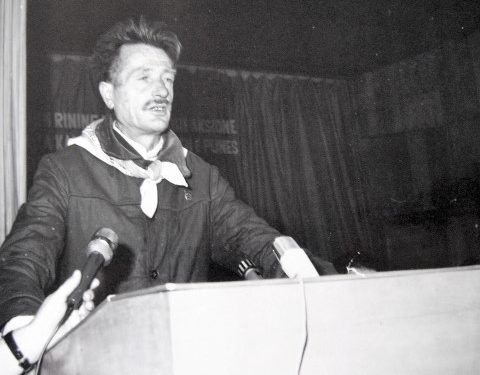
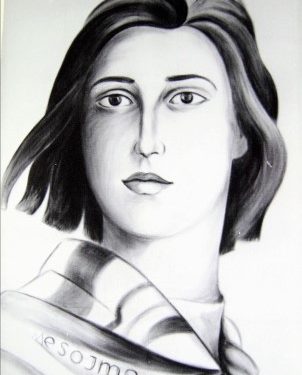
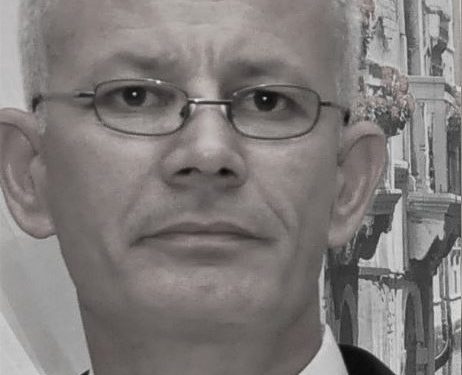
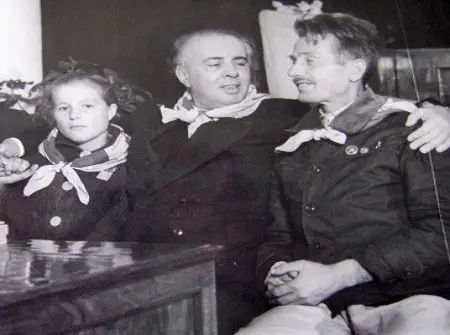
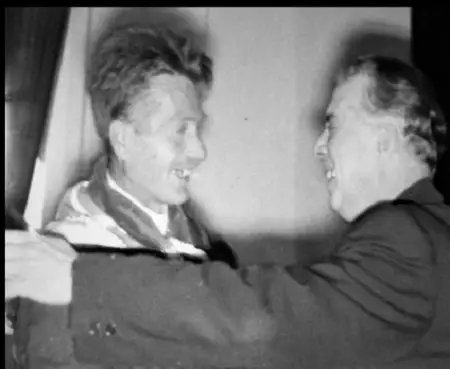


![“The ensemble, led by saxophonist M. Murthi, violinist M. Tare, [with] S. Reka on accordion and piano, [and] saxophonist S. Selmani, were…”/ The unknown history of the “Dajti” orchestra during the communist regime.](https://memorie.al/wp-content/uploads/2026/02/admin-ajax-3-350x250.jpg)
![“In an attempt to rescue one another, 10 workers were poisoned, but besides the brigadier, [another] 6 also died…”/ The secret document of June 11, 1979, is revealed, regarding the deaths of 6 employees at the Metallurgy Plant.](https://memorie.al/wp-content/uploads/2026/02/maxresdefault-350x250.jpg)


